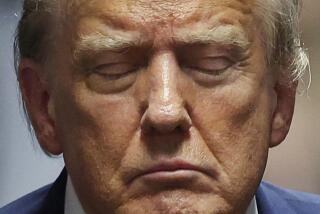Mystery Witness Worth a 2nd Look
- Share via
BAGHDAD — Jaafar Mousawi, the jovial but tough-talking prosecutor in the human rights trial of former Iraqi leader Saddam Hussein, asked his witness to enter the heavily guarded courtroom.
Judge Raouf Rasheed Abdel Rahman furrowed his brow. “What does he have to do with the case?”
As he entered, however, it became obvious: Abdul Aziz Bender, the man in the brown suit, looked exactly like Mousawi.
Personal attacks and the appearance in court of the prosecutor’s doppelganger were some of the dramatic moments Wednesday in the Baghdad trial of Hussein and seven codefendants.
The eight defendants have been charged with crimes against humanity for the alleged detention, torture and execution of 148 people from the mainly Shiite Muslim village of Dujayl after an assassination attempt against Hussein there in 1982. If convicted, the former dictator faces the death penalty.
At times, the trial has seemed a theater of the absurd, with rambling diatribes and appeals to history from lawyers and defendants alike. But lately, exasperation and fatigue have dominated the courtroom.
Defense lawyers have in the last few sessions attempted to discredit Mousawi and question the integrity of the prosecution. On Wednesday, the strategy seemingly backfired.
Defense lawyers had suggested, through witnesses and photographs, that Mousawi had visited Dujayl two years ago, celebrating the anniversary of the assassination attempt against Hussein. However, Mousawi’s look-alike testified Wednesday that he was the man shown in photos of the village party.
During Wednesday’s six-hour session, several new defense witnesses took the stand behind floor-length blue curtains. But Abdel Rahman, the judge, appeared to give little credence to key parts of their testimony.
One witness said that Mousawi, at a meeting in Dujayl, had given him a $500 bribe to give false testimony in aid of the prosecution.
“This is a serious charge,” Abdel Rahman told the witness. “And you have to think again before you accuse the prosecutor.”
The witness insisted, “Now I am telling the truth.” But the judge was not convinced and proceeded to scold the defense team.
“How can you accept such a witness?” he asked. “How can you let him harm the prosecutor, who is your colleague?”
Mousawi complained that the last few sessions had developed into a “fabricated attack” against him.
Barzan Ibrahim Hasan, Hussein’s half brother and fellow defendant, stood up and said that he also had been told to testify against Hussein. “Why don’t you ask about this matter that is undermining the legal system?” he asked the judge.
“All the time you give us moral lessons,” the judge told the once-feared former head of intelligence. “You’re abusing the time and the patience of the court.”
After a heated exchange between the two, the judge threw Hasan out of the courtroom. The defendant responded by saying he was leaving of his own accord. The judge, seemingly exasperated, asked under his breath for God’s help.
The last witness repeated defense allegations from Tuesday that a number of the scores of villagers from Dujayl said to have died at the hands of Hussein’s regime were never in fact killed. When the judge asked him to write down the names of those still alive, the witness had several lists at the ready, in two kinds of ink and handwriting, and bearing markings that suggested the involvement of people on the defense team.
After a lecture to the lawyers about maintaining the integrity of the judicial system, Abdel Rahman adjourned the court until Monday.
More to Read
Sign up for Essential California
The most important California stories and recommendations in your inbox every morning.
You may occasionally receive promotional content from the Los Angeles Times.












